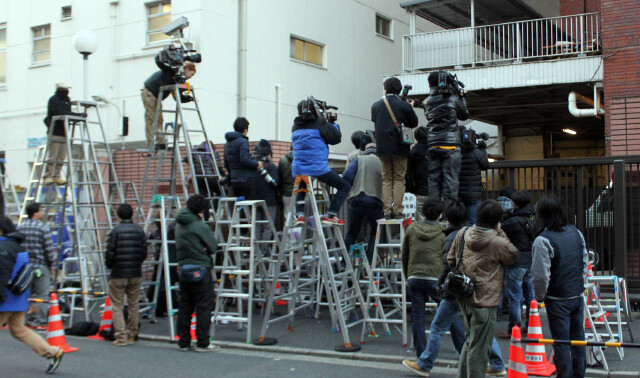hankyoreh
Links to other country sites 다른 나라 사이트 링크
S. Korean man arrested in bombing of Yasukuni Shrine

The South Korean male who has been pointed to as a suspect in the bombing of the Yasukuni Shrine in Tokyo, Japan, on Nov. 23 was arrested by the police upon his return to Japan.
Tokyo’s Metropolitan Police Agency announced on Dec. 9 that it was questioning a South Korean surnamed Jeon, 27, who was arrested on trespassing charges. Jeon was seen entering the Yasukuni Shrine shortly before the bomb went off.
Jeon arrived at Haneda Airport in Tokyo on Thursday morning and voluntarily agreed to accompany the police. Later, he was declared to be a suspect, according to a report by Japanese broadcaster NHK.
Currently, Jeon is reportedly denying the charges and claiming to know nothing about the explosion at the shrine.
“I came back to Japan to see the bathroom at the Yasukuni Shrine,” Jeon reportedly said during the police questioning.
Members of the Japanese far right held an anti-Korean demonstration near the Kojimachi Police Station in Chiyoda District, where Jeon is being questioned. “The Korean terrorist must not be forgiven!” the protestors shouted.
On Dec. 3, the Japanese media had identified Jeon has the prime suspect in the case. They cited Tokyo police, who had examined the footage from surveillance cameras in the shrine and had confirmed that Jeon had visited the bathroom in question about 30 minutes before the bomb went off.
In addition, a bundle of pipes containing a digital timer, batteries and wires that appeared to be of South Korean manufacture, and material presumed to be gunpowder, was also found on the scene.
The Japanese media had reported that Jeon was a leading suspect and had tried to reach him in South Korea, but the Japanese investigators declined to ask the South Korean government to extradite him. It was widely presumed that the circumstantial evidence acquired by the Japanese police was not adequate to request extradition.
Jeon served as a sergeant with the South Korean Air Force’s 38th Fighter Wing, based in Gunsan, North Jeolla Province from Dec. 2009 to Mar. 2015.
Before joining the air force, Jeon reportedly received a license as an electrician. After being discharged this past March, he lived alone in a studio apartment in the Soryong neighborhood of Gunsan before moving elsewhere in October.
Jeon’s mother, who runs a restaurant on Eocheong Island, off the coast from Gunsan, was reportedly shocked to hear the news of her son.
“My boy was always nice, meek, and introverted. He wasn’t the kind of person to do something like that. The Japanese must be trying to frame my son because we don’t have any influence or connections. On the news, they’re saying that he went back to Japan of his own will. I really don’t get it,” the mother was quoted by one of her friends as saying.
“The Japanese did not make an official request to the police to investigate. We did not receive any orders from our superiors. We were confused as well by the news that Jeon went back to Japan,” said an official with the Gunsan Police Department.
“We learned that he lived in Gunsan from news reports, too. When we talked to the landlord of his studio apartment, he told us that Jeon had asked him not to give his contact information to anyone else,” said an official at the Jeonbuk Provincial Police Agency.
By Gil Yun-hyung, Tokyo correspondent and Park Im-keum, North Jeolla correspondent in Gunsan
Please direct questions or comments to [english@hani.co.kr]

Editorial・opinion
![[Editorial] Does Yoon think the Korean public is wrong? [Editorial] Does Yoon think the Korean public is wrong?](https://flexible.img.hani.co.kr/flexible/normal/500/300/imgdb/original/2024/0417/8517133419684774.jpg) [Editorial] Does Yoon think the Korean public is wrong?
[Editorial] Does Yoon think the Korean public is wrong?![[Editorial] As it bolsters its alliance with US, Japan must be accountable for past [Editorial] As it bolsters its alliance with US, Japan must be accountable for past](https://flexible.img.hani.co.kr/flexible/normal/500/300/imgdb/original/2024/0417/6817133413968321.jpg) [Editorial] As it bolsters its alliance with US, Japan must be accountable for past
[Editorial] As it bolsters its alliance with US, Japan must be accountable for past- [Guest essay] Amending the Constitution is Yoon’s key to leaving office in public’s good graces
- [Editorial] 10 years on, lessons of Sewol tragedy must never be forgotten
- [Column] A death blow to Korea’s prosecutor politics
- [Correspondent’s column] The US and the end of Japanese pacifism
- [Guest essay] How Korea turned its trainee doctors into monsters
- [Guest essay] As someone who helped forge Seoul-Moscow ties, their status today troubles me
- [Editorial] Koreans sent a loud and clear message to Yoon
- [Column] In Korea’s midterm elections, it’s time for accountability
Most viewed articles
- 1Samsung barricades office as unionized workers strike for better conditions
- 2[Column] The clock is ticking for Korea’s first lady
- 3[Editorial] When the choice is kids or career, Korea will never overcome birth rate woes
- 4Why Israel isn’t hitting Iran with immediate retaliation
- 5[News analysis] After elections, prosecutorial reform will likely make legislative agenda
- 6S. Korea, Japan reaffirm commitment to strengthening trilateral ties with US
- 7Japan officially says compensation of Korean forced laborers isn’t its responsibility
- 8[Editorial] As it bolsters its alliance with US, Japan must be accountable for past
- 9[Editorial] Does Yoon think the Korean public is wrong?
- 10[Guest essay] How Korea turned its trainee doctors into monsters